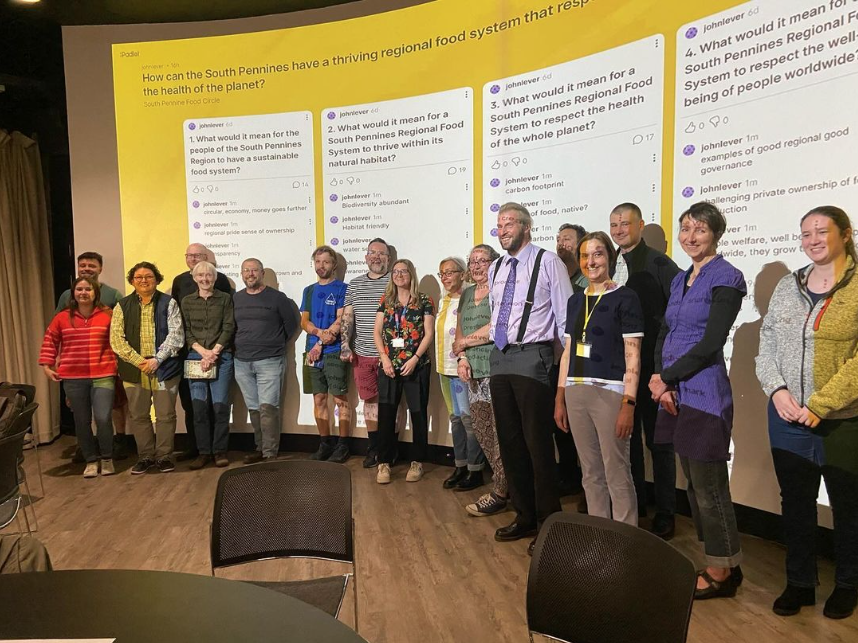First Meeting of SPFC
At the end of July 2023, the University of Huddersfield and South Pennines Park hosted the first meeting of the South Pennines Food Circle at Heritage Quay, University of Huddersfield. Funded via the AHRC Impact Accelerator Programme, the initiative aims to foster regional collaboration, promote locally produced food, and champion sustainable practices that can benefit local communities and regional economies in ways that protect nature.
Organised by Dr John Lever from the University of Huddersfield and Katherine Bates from South Pennines Park, the event was attended by approximately 25 people from across the region. Gareth Roberts from Regather Cooperative in Sheffield got the event underway with a talk and a Q&A session on his experiences from South Yorkshire before participants took part in a series of round table discussions and activities on the future direction of the Food Circle.
Photography ©John Lever
Photography ©John Lever
In the first activity, participants were asked to discuss and answer four questions about what it would mean for the South Pennines Region to have a sustainable food system that benefitted people socially and ecologically at both the local and global levels. What stood out was the feeling that people everywhere should work seasonally wherever possible. This was linked to the need to educate people about food and increase transparency about where food comes from, which would in turn enhance regional resilience and get people to think about ownership in the food system, all of which would enhance a sense of local and regional pride.
Participants thought that to be achievable these ideas would require changes to land use, locating and valuing local/ regional expertise, using less pesticides and different types of energy, and making improvements to regional infrastructure and transport. This would in turn help 2 movement towards a circular economy by reducing waste and closing resource loops in ways that protect regional habitats, enhance biodiversity, and keep money in the regional economy, while improving water security and local/ regional knowledge.
Photography ©South Pennines Park
Photography ©John Allen
All of this was seen to reflect ways of contributing to reductions in carbon emissions globally and demonstrating to communities everywhere that collaboration is possible and that people everywhere must work in similar ways to make the food system more resilient and sustainable. Working in these ways would entail less food processing and rethinking the branding of food to reflect the required changes in healthier eating habits. It would also demonstrate and provide examples of good regional food governance that challenges private ownership of food supply, valuing the welfare of everyone who produces and consumes food, and developing shared understandings of regional food provenance globally.
Building on this, in the second activity participants were asked to discuss and prioritise a number of alternative ways forward for the South Pennines Food system. Four key priories were highlighted, and a fifth was proposed.*
1. A social enterprise along the lines of the model adopted by the York Food Circle, with weekly markets. These could take place in different places around the region at unusual times to suit producers and consumers (i.e. late in the evening). This could also help to facilitate a regional identity (rather than simply a town’s identity) by engaging widely and allowing people to build new relationships.
2. An online shopping website where products can be ordered online and delivered and/ or collected from a hub. Local delivery with booking slots and low-carbon deliveries would be useful, all of which would increase the visibility of local producers and be good for consumers. This approach would also help a wide range of people to access food, including older people, who would not have to travel to the market when food might not be there. Producers will also know that they have buyers, and they wouldn’t necessarily have to be available all day to sell, which will be useful during growing and harvesting seasons. This approach is dependent on finding the right locations and times.
3. A network of local and regional food hubs for food drop-offs and pick-ups, and the collection of waste. There was a feeling that this should operate on a hyper-local basis to reduce the dependence of some groups on food surplus from supermarkets.
4. A regional branding initiative would be empowering for businesses and could have educational benefits and add value to 1. & 2. above. This could also potentially boost local pride and consumer recognition for local growers and producers.
5. A traffic light system was proposed for traceability to highlight where products originate, which could be linked to 4. Above.
We will be in touch again soon to outline the next steps, please watch this space…
*The overall set of ideas for this activity came from discussions and consultation with a wide range of local and regional food enterprises over a number of years.




